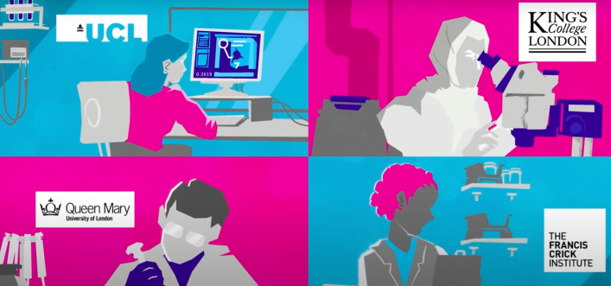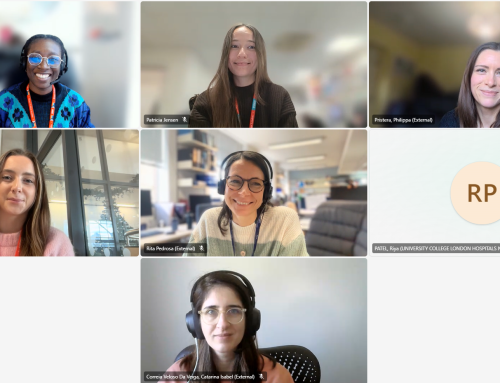
The Cancer Research UK City of London Radiation Research Centre of Excellence has today (Wednesday 30 October) set out its future strategic priorities. It has received renewed funding of £5.9 million from Cancer Research UK, to add to £12 million leveraged from partners including the Engineering and Physical Sciences Research Council (EPSRC), Wellcome Trust, and National Institute for Health and Care Research (NIHR), as well as the Barts Charity and Guy’s Cancer Charity.
The new funding will allow the Centre to continue its world-class research, with areas of focus including the biological understanding of radiation resistance, investigating new radiation drug combinations, and developing new clinical trials. By growing its portfolio of clinical trials, the Centre will pursue its “bench to bedside” pipeline, prioritising cancers of unmet need.
Dr Simon Boulton, Director of the CRUK City of London Radiation Research Centre of Excellence and Principal Group Leader at The Francis Crick Institute, said:
“We are very grateful to Cancer Research UK for their continued support of our cross-institutional initiative to evolve and improve radiotherapy treatments for the benefit of cancer patients.
“This commitment, together with leveraged funds from our institutions, local charities and industry partners, will allow us to build on the remarkable success of the first five years of RadNet.”
The CRUK City of London Radiation Research Centre of Excellence was established in 2019 and brings together researchers from Barts Cancer Institute (Queen Mary University of London), King’s College London, University College London and The Francis Crick Institute.
During its first five years, the CRUK City of London Radiation Research Centre of Excellence has contributed to seven new clinical trials. Among others, these include RELIEF, a phase III trial investigating the use of the OptiFibre prebiotic in preventing radiation enteropathy in prostate cancer, and HIT-Meso, a phase III trial looking at the use of Hemithoracic irradiation with proton therapy in malignant pleural mesothelioma.
The Centre has embraced Patient and Public Involvement and Engagement, carrying out over ninety activities aimed at inspiring and informing, consulting and collaborating with patients with lived experience of radiotherapy. Its audience will now expand to include family, friends, and carers through activities such as showcasing research at events, and hosting lab tours and career talks for schoolchildren.
So far, Cancer Research UK has invested over £42 million in its radiotherapy network. Increasing understanding of the underpinning biological mechanisms in radiotherapy, and how best to apply and deliver it, is a priority for the charity.
Dr Iain Foulkes, Executive Director of Research and Innovation at Cancer Research UK, said:
“Cancer Research UK, and its predecessors, have been at the forefront of radiation research for the past 120 years. Thanks to research, radiotherapy treatment is becoming kinder, more precise and less intensive across different cancers.
“This funding marks a new phase of our RadNet network, advancing research which will further accelerate improvements in radiotherapy treatment in the clinic. This funding will work alongside our investments in pioneering radiotherapy clinical trials to ensure more people can live longer, better lives, free from the fear of cancer.”
Professor Maria Hawkins, Clinical Director of the CRUK City of London Radiation Research Centre of Excellence and Radiation Oncologist at UCL, said:
“We’re so proud to have established the UK’s largest group of early career biologists to apply their knowledge to studying radiation, but our ambitions do not stop there.
“Our renewed funding will see ongoing innovation in our research areas and collaboration with the NHS and industry, as well as a renewed focus on patient impact and building sustainability through supporting early career researchers.”
The Centre has a focus on building sustainable career paths in radiotherapy. It has successfully recruited outstanding scientists and clinicians and provided seed funding, PhD student appointments, mentoring, and access to cutting-edge technologies.
Dr Ivana Bjedov, CRUK Senior Cancer Research Fellow, said:
“The Centre has been crucial in my career development, providing the funding that helped me pursue interesting findings in radioprotection, and connecting me with the clinicians, radiologists and experts in DNA repair who helped spark new ideas.
“I’m delighted by this new funding, and excited to see the Centre start tackling the next big challenges, such as exploring combinations with immunotherapy or furthering our understanding of Proton Beam Therapy.”




